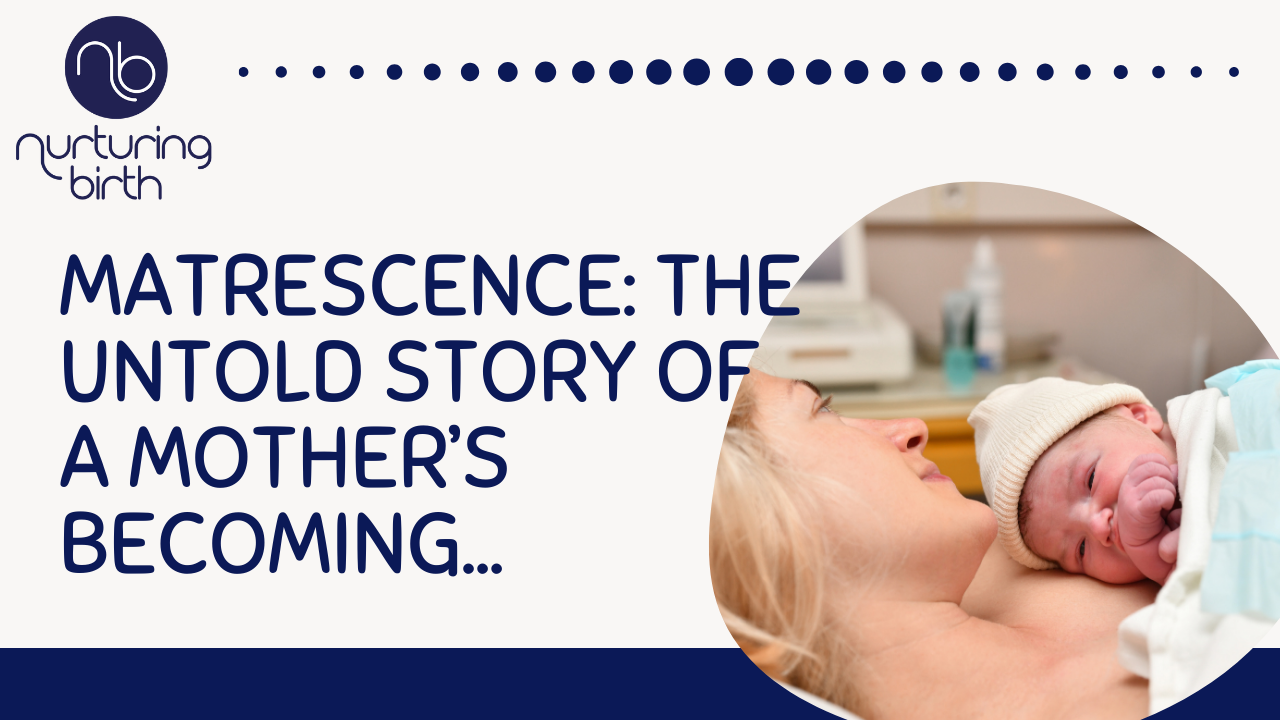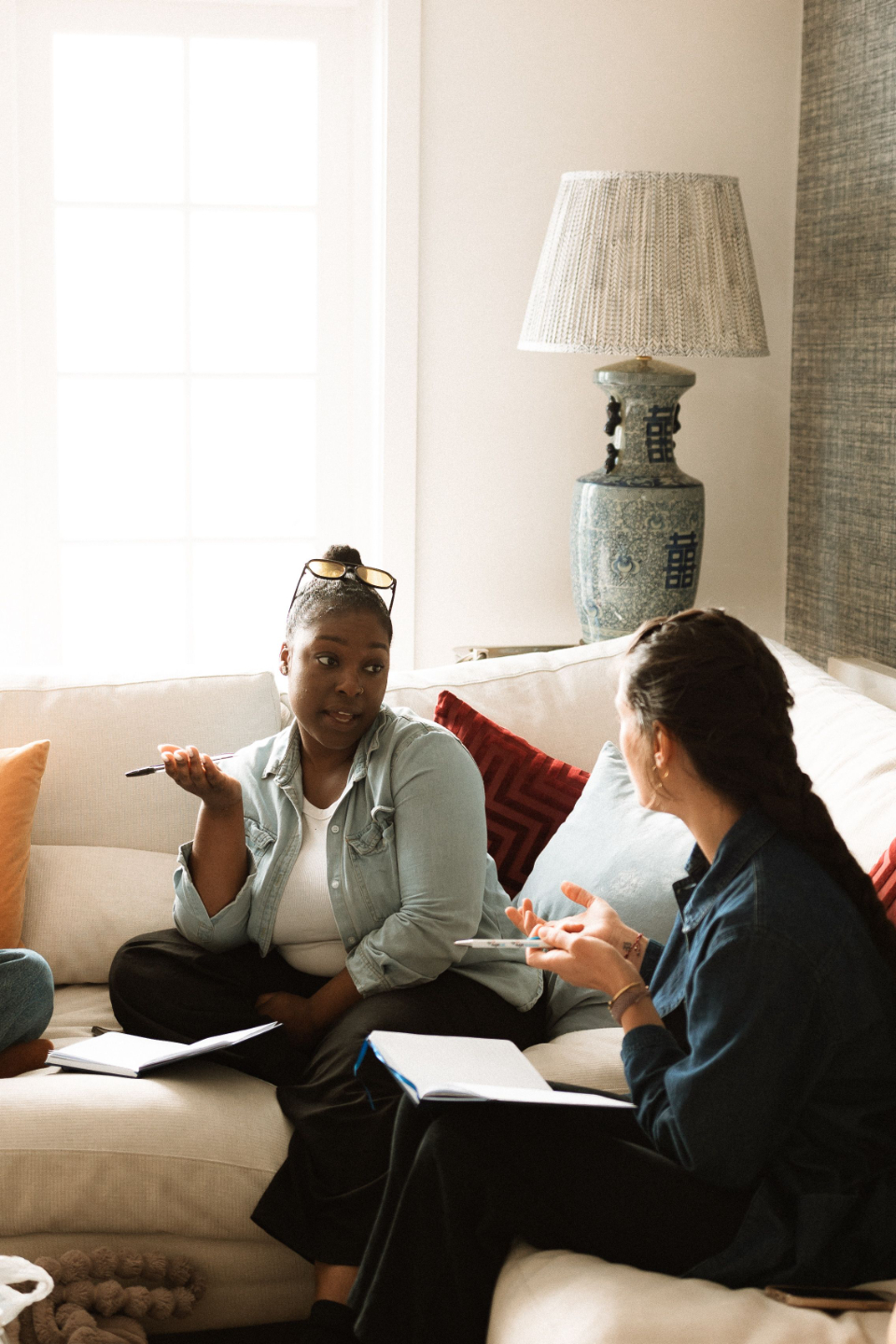
Matrescence: The Untold Story of a Mother’s Becoming…
Jan 10, 2022No one told me it would be like this. I had wanted a baby since my teenage years. I’d craved the closeness of a newborn, fantasised over the kind of happy, centered mother I’d be and yearned for the love shared between parent and child. However, when my first child was born, what I felt bore very little resemblance to that which I’d anticipated.
The seismic shift in identity, from maiden to mother, left me feeling lost, unable to reconcile the woman I saw in the mirror with the one I felt inside. I saw myself as a sort of ghost, aimlessly drifting between who I was before and who I was expected to become. I grieved for the loss of that sense of self and the apparent loss of the things I used to do before…before having this baby.
I was so angry because nobody told me. Nobody told me that I could have all this love but that it would come at a cost; that motherhood was a trade-off. In order to have a baby, I’d need to become a mother and that meant putting my needs to the side, even those very basic physical needs such as going to the bathroom when I needed – preferably alone! – eating, exercising, making love…
I felt ashamed because I was struggling. I felt regret at having ‘done this’ to my relationship. I loved my daughter intensely but I hated how invisible and disconnected I felt. I believed I was alone in my suffering. I thought nobody would understand. I feared I’d never feel happy again. Sometimes I would fantasise about stepping out into a busy road, being hit by a car and breaking my pelvis or a hip. Surely, that would put me in hospital long enough that I could have a break from ‘mothering’ and find a way to reconnect with myself.
I don’t remember exactly when things got better. I do recall a 5-Day work trip to Las Vegas – without my daughter – just before her second birthday. I had this energising sense of absolute freedom. I could see the light… And gradually, as she started nursery, I began to work more, and she started waking less at night… I sort of, somehow, returned. Not exactly the same but good enough. Better, in fact. Evolved, maybe.
Parent or not, most of us will have felt as I did at another time in life… Do you remember? When you were unsure of who you were, of what was expected of you, of what you wanted or needed? When you had all the feelings and none of the vocabulary to articulate them? Do you remember that time when hormones surged through your body and you flew from one extreme emotional state to the next? Body hair appearing in surprising places, bodily odours to make your eyes water and spots, so many spots!
We all transitioned from childhood to adulthood through our pubescence years, through adolescence. During this time our bodies and brains were in radical change. Hormones altered everything from how we looked to how we felt and thought. Countless new neural pathways were winding their way through our expanding brains as we learnt to ‘level-up’.
Physiologically, the changes experienced in the body and brain of a new mother are akin to those seen in the adolescent teen. As women and birthing people transition into parenthood, great neurobiological adaptations occur. It is no wonder that we can feel as lost during this time, as perhaps we did in our teenage years.
First coined by anthropologist Dana Raphael, the conceptual term matrescence describes the transition into motherhood, thought to commence in pregnancy and continue until at least a year after a baby is born. Clinical Psychologist, Dr. Aurelie Athan in her 2015 publication Maternal psychology: Reflections on the 20th anniversary of Deconstructing Developmental Psychology discusses changes the new mother navigates including those which are…physical (changes in body, hormonal fluctuations); psychological (e.g., identity, personality, defensive structure, self-esteem); social (e.g., re-evaluation of friendships, forgiveness of loved ones, gains in social status, or loss of professional status), and spiritual (e.g., existential questioning, re-commitment to faith, increased religious/spiritual practices).
That’s a lot of shifting!
I speak to many new, first-time mothers and there are many commonalities in the feelings they describe. One new mother – a high-income earning professional woman used to managing large teams and making huge decisions – said she’d lost the ability to make even the simplest of decisions such as what to have for breakfast and that the confidence she had felt as working professional in a cut-throat corporate environment had completely vanished. Since having her son, she continually felt worried, second-guessed her decisions and doubted her ability as a mother. The feelings of uncertainty and self-doubt were so unfamiliar for her, she was finding it difficult to understand the changes she was experiencing. Reassuringly, after a few months things calmed down, she gained confidence and began enjoying motherhood so much that she decided not to return to the corporate world but to retrain and work part time around the needs of her son.
Similarly, I sat with a first-time mum one afternoon who shared with me that she would often wake throughout the night to check her baby was breathing. No matter how many times she checked, she was rarely reassured. She also explained that she would imagine frightening things happening when they left the house. The intrusive thoughts concerned her and she wondered if she was developing postnatal depression. Thankfully, by shining a light on the prevalence of intrusive thoughts during the postnatal period, talking through whether the intrusive thoughts were impacting her ability to go about her day in a ‘normal’ way, and by supporting her to get a few decent night’s sleep, she moved through this stage fairly quickly and the intrusive thoughts soon stopped.
Another new mother I spoke at length with explained that since having her baby she’d felt a real disconnect from her partner. Certain idiosyncrasies of his really bothered her, things that she’d found quite endearing before giving birth. Mainly, she was irritable and frustrated.
She realised she was focussing those feelings on her partner, but actually they were really generalised. She noticed she had also been distancing herself from her ‘new-mum group’ both from their virtual chat and from their meet-ups because she also felt annoyed in their presence. She also felt great sadness about the prospect of not being able to do the things she had so enjoyed before having a baby such as visiting galleries and having the time to indulge in her own creative projects.
With some support, she was able to create time to start to paint and we found a local gallery that she could walk to with the pram. Gradually she began to see a way to integrate some of those things that were important to her sense of identity, and in doing so, she felt more like her old self and more able to enjoy the company of others.
Irritability, annoyance, frustration, a sense of dissatisfaction, disappointment, loss/ grief, hypervigilance and intrusive thoughts; these are all commonly experienced during one’s matrescence. With puberty, we expect and accept that a teenager’s experience of adolescence will be challenging at times. And yet the same consideration is not offered to a mother navigating her matrescence. Societally we expect new mothers to be happy, grateful, blissful, albeit tired but on the whole, positive. If a new mother communicates that she is feeling conflicted or challenged, she is often assumed to be experiencing postnatal depression and yet her set of ‘symptoms’ don’t fit within the clinical definition of depression. Or, she is incorrectly diagnosed with postnatal depression and prescribed medications and/or often a course of Cognitive Behavioural Therapy.
So, how can we better support new mothers throughout their matrescence so that they receive the right kind of support?
Firstly, we need to normalise Matresence but understanding that ‘discomfort’ is not the same as ‘disease’ and by communicating with each other honestly and openly with each other about how the transition into parenthood can feel. De-stigmatising the tougher feelings connected to becoming a mother can only be achieved when we shine a bright light on these aspects, drawing them out of the shadows, dragging them away from guilt and shame and towards a more compassionate place of acceptance.
Secondly, creating adequate time and ritualised space for a new mother to become could be so beneficial for so many. In the west we seem to have largely forgotten the practice of, and the need for a lying-in period; that sacred time, often around 6-weeks or 40 days post birth where a new mother is nurtured, pampered, massaged, nourished, supported and loved upon. She gets to rest, heal and recover whilst taking all the time she needs to learn how to tune in and respond to the needs of her babe. A modern version of a traditional postnatal confinement may help in lessening the stresses of managing everyday tasks, in order that new parents can more securely navigate the rollercoaster of matrescence.
And finally, I am a firm believer that nobody ought to ride the waves of early parenthood alone. We are social creatures who have benefited since the beginning of mankind from living communally. So, if you are expecting or planning a baby soon, you may want to consider who you can gather to be your supportive network, or your ‘postnatal power-team’ as I like to refer to it. Your Power Team might include reliable friends and family who can offer practical support around your home by taking responsibility for the daily chores and preparing nourishing foods. Your Power Team might include professionals to care for your emotional needs – such as therapists and counsellors – and your physical needs – such as lactation consultants, women’s health specialists or physiotherapists. It could also include holistic therapists to help calm and ground your energy as well as boost your oxytocin levels – think massage therapists, reiki healers, reflexologists, osteopaths.
And if all this seems like WAY TOO MUCH of a bother, you might consider hiring a rockstar postnatal doula who will facilitate the assembly of your Power Team and tend to all of your practical, emotional and informational needs. Some Doulas are incredible cooks and highly skilled in cooking nourishing meals designed to aid healing and recovery from childbirth. A Doula could support you throughout your matrescence by offering assurance and enabling you to build your confidence in your new role, in your own time and your own, unique way.
Charlotte is a mother of two fierce brave-heart girls. She lives in Hampshire and was a Birth and Postnatal Doula, course facilitator and mentor for Nurturing birth for many years.
Learn more about the Nurturing Birth Doula Training Experience
Free download available NOW!
We hate SPAM. We will never sell your information, for any reason.


